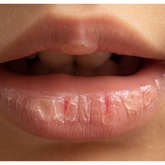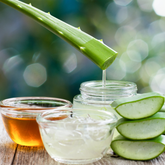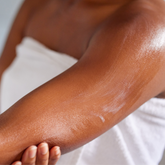
Five Ways to Care for Newborns With Melanin-Rich Skin

While many products available for babies smell wonderful and have beautiful, colorful bottles, some companies include harsh ingredients that increase shelf-stability and reduce manufacturing costs. For parents concerned about natural skincare for children, companies often charge exorbitant prices for products containing natural ingredients.
Melabebe believes melanin-rich skin is beautiful, and the key to keeping it healthy is a focus on ingredients that are natural and gentle on your child’s skin. Skincare for melanin-rich skin is easy once you know how to care for it properly.
Needs of Newborn Melanin-Rich Skin
While every newborn has sensitive skin, melanin-rich kids often have different skincare issues than newborns without as much melanin. As a result, this beautiful skin requires slightly different melanin-rich skin nourishment.
-
Dryness and Dark Spots
Because melanin-rich skin is naturally more sensitive, it is prone to dark spots and dryness, especially around the elbows, knees, legs, feet, and back.
If you notice your newborn’s skin looks ashy, that’s an indicator that your baby has dry skin. To prevent ashy buildup, it’s important to moisturize your baby’s skin using natural care products like almond oil, calendula, and chamomile.
Do not try to exfoliate your baby’s skin to remove the ashy layer; because a newborn’s skin is so sensitive, this will lead to irritation and sensitivity.
-
Eczema
Common in many newborns, eczema occurs more often in melanin-rich skin. It usually appears within the first six months on a baby’s cheeks, forehead, scalp, and back of the arms.
When a newborn has eczema, you’ll notice red and bumpy skin with a rough or flakey texture. In melanin-rich skin, eczema sometimes presents as small pinpoint bumps or light patches that appear scaly.
Eczema is itchy and can make your baby uncomfortable. To soothe your baby’s skin, bathe your baby frequently in slightly warm water using a mild, fragrance-free soap and apply a moisturizer immediately after you pat them dry with a soft towel to trap as much moisture as possible.
To prevent itching and scratching, keep your baby’s nails trimmed short and consider soft mittens for your baby’s hands, especially at night when they may scratch in their sleep. If the condition is severe, reach out to your pediatrician for hydrocortisone cream.
-
Transient Neonatal Pustular Melanosis (TNPM)
Present in 5% of newborns, transient neonatal pustular melanosis (TNPM) presents as small white bumps that will pop and leave tiny flat brown spots behind. Fortunately, TNPM is considered a temporary condition, meaning it disappears naturally within 2-3 months.
To avoid permanent dark spots, treat with moisturizer, but do not apply any dark spot correctors because they are too powerful for newborn skin and cause irritation.
-
Dermal Melanocytosis (Mongolian Spot)
These harmless birthmarks appear in 90% of Native American and Black babies, 80% of Asian babies, and 70% of Hispanic babies. The marks vary in size but are a dense collection of melanocytes, or skin cells containing melanin, which appear mostly on the buttocks, lower back, legs, back, and shoulders. They generally disappear by age 4.
Often, these marks are very concerning to new parents as their colors often mirror that of a bruise. If the melanocytes are gathered near the skin’s surface, these marks appear brown, but if they are located in lower skin layers, they take on a blue or purple tint.

5 Ways to Care for Your Newborn’s Melanin-Rich Skin
At birth, your baby’s melanin-rich skin may appear lighter, but over your baby’s first three weeks of life, it will darken to its natural color. To help keep it healthy, follow these tips.
-
Bathe your newborn properly
During the first few weeks, while the umbilical cord site heals, stick to sponge baths.
Once your baby’s umbilical cord site has healed, bathe your baby in a shallow tub or sink, but be careful not to leave your baby in sudsy water for too long. Melanin-rich skin dries out easily, and many baby washes, even those specially formulated for melanin-rich skin, can rob the baby’s skin of natural oils. It’s best to use the baby wash at the very end of the bath and avoid bubble baths.
-
Moisturize immediately after bath
For sensitive baby skin, you want to trap the natural moisture of the water as soon as possible, so apply a moisturizer immediately after the baby’s bath. Avoid alcohol and scented products. If your baby’s skin needs additional moisture, consider adding a naturally formulated baby oil to help lock in moisture, especially during the winter.
In winter, thick emollients, like vitamin E and coconut butter, provide improved moisture care without parabens, making them more effective and less irritating to a baby’s delicate skin.
-
Protect skin from the sun
Many people are under the misconception that melanin protects you from all harmful sun rays, so they believe melanin-rich skin doesn’t need a sun protectant, but that is simply not true. Protect your melanin-rich baby’s skin from the sun at all times, limiting sun exposure and applying a broad-spectrum sunscreen free from nano-particles and high in natural ingredients like zinc oxide.
-
Stick to natural ingredients, avoiding harsh chemicals, detergents, fragrances, and dyes
Due to its sensitivity, melanin-rich skin should avoid harsh chemicals, detergents, fragrances, and dyes whenever possible. Ingredients like calendula, chamomile, and oatmeal are soothing and leave behind a clean, delicately scented skin while preserving the natural oils.
-
Don’t forget the shampoo ingredients
Both skin and hair routines are important, but we often forget to check that shampoos and conditioners also include naturally derived ingredients. Textured hair also requires a different formula for proper care to maintain its original structure.
Melebebe Knows Melanin-Rich Skincare for Children
New motherhood is stressful, but skincare for melanin-rich children shouldn’t be.
Melabebe’s All-in-One Deep Hydration Crème is made from ingredients unchanged from nature so that you can rest assured that the moisturizer you apply to your baby’s delicate skin, whether it’s dry or prone to eczema, is safe. The All-in-One Deep Hydration Crème is suitable for all skin types at all stages of life, not just infancy.





